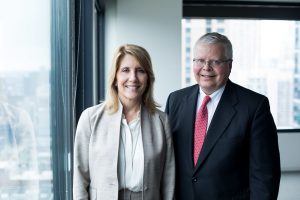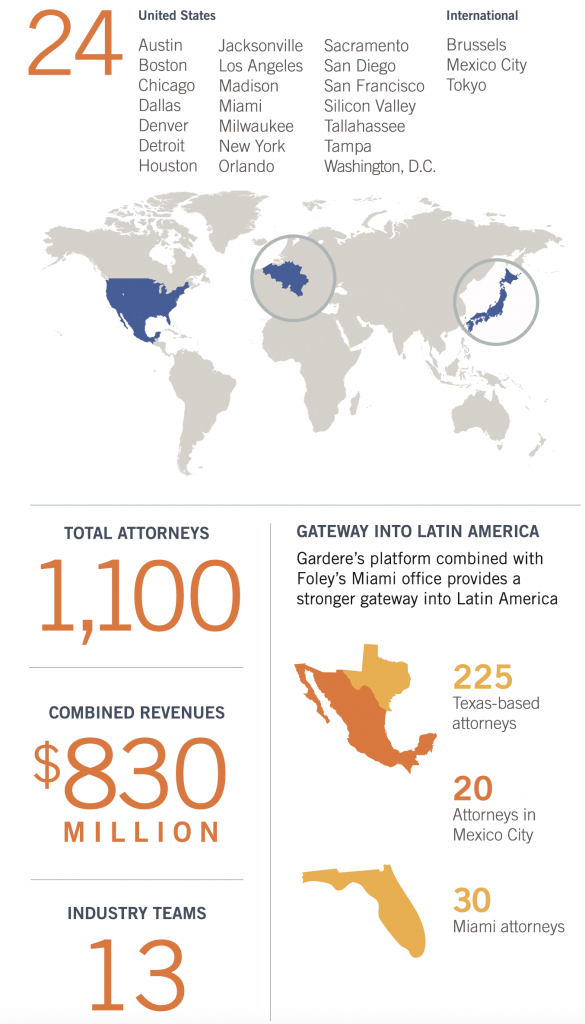© 2018 The Texas Lawbook.
By Allen Pusey and Mark Curriden
(March 30) – In a transaction at least two years in the making, Dallas-based Gardere Wynne Sewell has agreed to merge with Milwaukee-based Foley & Lardner, ending Gardere’s 109-year reign as one of Texas’ oldest and most distinguished standalone regional law firms.
The merger — which was approved by partners in October and the details ironed out by senior leaders during the past five months – becomes effective April 1. The resulting new firm will be known in Texas (and Colorado) as Foley Gardere and in Mexico as Foley Gardere Arena. The combined firm will have 1,100 lawyers in 24 offices located in the U.S., Europe, Asia and Mexico; and with combined revenues of $830 million, the firm will rank among the top 50 of U.S. firms.
“We’d been looking at Texas for a long time,” said Jay Rothman, Foley Chairman and CEO. “We had a number of clients doing business in Texas. There was great geographic pull.”
Holland N. “Holly” O’Neil, the soon-to-be former chair of Gardere, echoed Rothman’s enthusiasm.

“It’s really good for our clients. It’s really good for our lawyers and staff. And it’s really good for the future of our firm,” she said in an exclusive interview with The Texas Lawbook. “Our clients were expanding nationally and internationally, and we needed to grow with them.”
O’Neil said she recognized the need for some form of merger, almost from the moment she took the reins as the first woman chair at Gardere in 2013.
“A legal market like ours is in hyper-drive. Lateral hiring is very costly and it takes a lot of time,” she said. “With everything moving at a swifter pace, you end up in terminal ‘catch-up’ mode. The main growth comes in mergers. But even at that, we were pretty darn picky.
“As you can imagine, being the smaller firm, it could have been easy for them to treat us like an acquisition,” O’Neil said. “We had a nice, long courtship. There were a lot of details to work out.”
O’Neil said that Gardere leaders “benchmarked the qualities” the firm wanted in any potential merger partner.
“We were not interested in a firm that just wants to fly a flag in every port,” she said. “Foley checked off almost all of our boxes.”
Mergers have been an important part of Gardere’s history. Since opening its first iteration as Wynne & Wynne in Wills Point in 1909, the firm has survived a number of transitions. It was a 1979 merger between Wynne & Jaffe and Gardere, Porter & Dehay, for instance, that ultimately resulted in the 1981 formation of Gardere & Wynne.
The current merger gives Foley an immediate new presence in Texas—with offices in Dallas, Houston and Austin—as well as outposts in Denver and Mexico City. Foley Gardere, likewise, is expected to benefit from Foley’s influential presence across the Midwest, new offices in key cities on both U.S. coasts and a presence in such important cross-border locations as Belgium and Tokyo.

Moreover, the merger helps both firms expand on practice strengths and firm-up where there are practice weaknesses. Where Foley boasts strengths in renewable energy, Gardere’s 244 lawyers provide experience in oil and gas. Where Texas has an emerging healthcare market, Foley has well-regarded healthcare expertise. Where both firms are eyeing growth in intellectual property and litigation matters, their resources and interests converge.
“Take, for instance, Mexico,” said Rothman. “We surveyed our clients, and saw that 75 percent had some connection with Mexico. So, add to everything else a Gardere office in Mexico City and it becomes very interesting,” Rothman said. “The logic of the transaction was compelling.”
“And ‘green-fielding’ in Texas is nearly impossible,” he added.
The combination also means that Gardere will have access to Foley’s extensive experience in the automotive, life sciences, sports and technology sectors – as well as its deep bench of government affairs talent in Washington, D.C.
But beyond the logic, both firm leaders said it was the compatibility of the two cultures that proved to be the most compelling advantage. During the course of nearly two years of courtship, the two sides—Chicago Midwestern and Texas Traditional—discovered that they really liked each other.
“Combinations can look pretty good on paper. The resources and interests can be completely complementary. But if the people don’t click, it won’t work,” said Rothman.
“The cultural fit with Foley was very natural,” echoed O’Neil.
A number of lawyers — O’Neil sets the number at “about a dozen”—have already decided to leave the firm, mainly because of conflicts or because they felt Foley was not the right fit for their practices. Rothman says attrition can be expected in any major transition. But even in the face of protracted negotiations, the talent migration from Gardere remained minimal—a result both Rothman and O’Neil credit to the cultural comfort experienced between the two merging staffs.
“Our profession is going through tremendous change,” said Rothman. “If you don’t enjoy what you’re doing and the people you’re doing it with, it isn’t very satisfying.”
© 2018 The Texas Lawbook. Content of The Texas Lawbook is controlled and protected by specific licensing agreements with our subscribers and under federal copyright laws. Any distribution of this content without the consent of The Texas Lawbook is prohibited.
If you see any inaccuracy in any article in The Texas Lawbook, please contact us. Our goal is content that is 100% true and accurate. Thank you.
